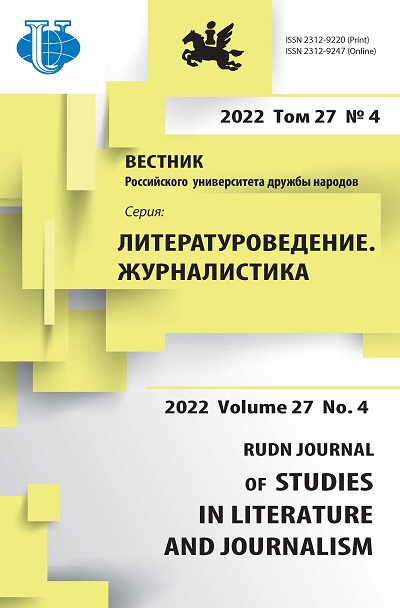Paradoxes of chronology in the novel “Doctor Zhivago” by B.L. Pasternak
- Authors: Zou W.1, Kolomytseva O.N.1
-
Affiliations:
- Lanzhou University
- Issue: Vol 27, No 4 (2022)
- Pages: 651-659
- Section: LITERARY CRITICISM
- URL: https://journals.rudn.ru/literary-criticism/article/view/33276
- DOI: https://doi.org/10.22363/2312-9220-2022-27-4-651-659
- ID: 33276
Cite item
Full Text
Abstract
The interpretation of time in the novel by B.L. Pasternak “Doctor Zhivago” is discussed. The role of 1918 in the book is noted: firstly, the novel was conceived this year, and secondly, it describes the events of this year. It is indicated that, starting from the post - revolutionary period, time in the novel loses its accuracy and linear character, begins to unfold unevenly, reflecting the perception of events by the main character - Yuri Andreevich Zhivago. The authors assume that the nonlinearity of time, its free perception are connected with the awareness of what is happening by the hero of the novel and with the influence that the revolution had on him. The analysis of the interpretation of time in the novel shows that it is not the events, not the historical time that become important in it, but the development of the hero together with the whole country, that is, personal and public time. The description of the events of 1918 in the novel reflects the transformations of time: some events are depicted in detail, others are only mentioned. It is concluded that the historical time in the novel by B.L. Pasternak becomes next to the psychological, depending on the perception of events by their participants, and the work itself becomes both a psychological novel and a historical one.
Keywords
About the authors
Wenyao Zou
Lanzhou University
Author for correspondence.
Email: zouwenyao@mail.ru
PhD in Philology, lecturer, Faculty of Russian Language 222 Tianshuinanlu Ave, Lanzhou, Gansu, People's Republic of China
Oksana N. Kolomytseva
Lanzhou University
Email: kolomytseva.90@mail.ru
ORCID iD: 0000-0001-9553-6462
Candidate of Pedagogical Sciences, teacher, Faculty of Russian Language
222 Tianshuinanlu Ave, Lanzhou, Gansu, People's Republic of ChinaReferences
- Dragunova, Yu.A. (2016). Man and history in B. Pasternak's novel “Doctor Zhivago”. Slavic collection: Materials of the XII All-Russian (with International Participation) Slavic Readings (p. 69–73). Oryol: Orel State Institute of Culture. (In Russ.)
- Ermolov, L.I. (2012). Time in B. Pasternak's novel “Doctor Zhivago”. Bulletin of Saratov University. New Series. Series: Philology. Journalism, 12(2), 80–84. (In Russ.)
- Gasparov, B. (1990). Temporal counterpoint as formative principle of Pasternak's novel “Doctor Zhivago”. Druzhba Narodov, (3), 223–242. (In Russ.)
- Gasparov, B.M. (2013). Boris Pasternak: Beyond poetics (philosophy, music, life). Moscow: Novoe Literaturnoe Obozrenie Publ. (In Russ.)
- Kutsaenko, D.O. (2011). The concept of history as a determining factor in the genesis of characters in Pasternak’s “Doctor Zhivago” (abstract of the thesis of Candidate of Philological Sciences). Krasnodar. (In Russ.)
- Nichiporov, I.B. (2005). Images of A. Blok in poems by M. Tsvetaeva, A. Akhmatova, B. Pasternak. In I.Yu. Belyakova (Ed.), Element and Mind in Life and Work of Marina Tsvetaeva: XII International Scientific Conference (Moscow, October 9–11, 2004): Collection of Reports (pp. 157–164). Moscow: Dom-muzej Mariny Cvetaevoj Publ. (In Russ.)
- Pasternak, B.L. (2012). Doctor Zhivago. Moscow: OLMA-PRESS. (In Russ.)
- Polyakov, K.M. (2015). “Doctor Zhivago” as a historical novel. Tartu. (In Russ.)
- Poselyagin, N.V. (2011). Time and Space in the Narrative Structure of the Text. New Philological Bulletin, (3), 25–43. (In Russ.)
- Potapov, D.V. (2010). B. Pasternak's novel “Doctor Zhivago” as an analyst of personal and historic concepts in Soviet history. Social and Humanitarian Bulletin: Collection of Scientific Articles (pp. 75– 79). Krasnodar: Minenergo Rossii Publ. (In Russ.)
- Skorospelova, E.B. (2003). Russian prose of the 20th century: from A. Bely (Petersburg) to B. Pasternak (Doctor Zhivago). Moscow. (In Russ.)
- Zhilicheva, G.A. (2013). The configuration of time in the narrative of B. Pasternak's novel “Doctor Zhivago”. Siberian Philological Journal, (3), 130–141. (In Russ.)
Supplementary files















